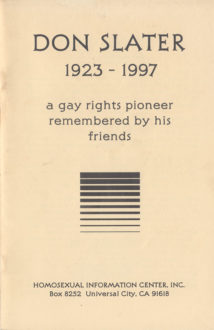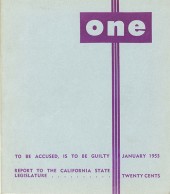 Learning to Cook
Learning to Cook
by Morris Kight
Don Slater:
a gay rights pioneer remembered by his friends
©1997 by Homosexual Information Center, Inc.
Jim Schneider, Chairman
Pp. 22–24
Second Printing, revised
Assembled, edited, and composed by Joseph Hansen
Laguna Beach, CA
My, how the years rush on!
I am not absolutely sure what year I was first in contact with Don Slater, or where his offices were, Hill Street? Venice boulevard?
We may have met in 1953, but in 1957 I came to live on Bunker Hill, which was Don’s neighborhood. I had been making forays into Southern California from northern New Mexico to scout out the gay community, and that year decided this was the place for me.
I needed someone who knew the lay of the land and, believe me, Don knew it. He was born here, studied library science at the University of Southern California [1]Actually Slater was an English major who worked for USC’s Doheney Memorial Library (ed.-ctw), and in the early days of Mattachine, decided to throw in his lot with what Dorr Legg was pleased to call the “homophile” effort.

Soon he convinced Dorr and a handful of stalwarts to launch ONE, a gay magazine not to be circulated hush-hush in a plain brown wrapper, but sold openly on news stands.
Don had strong opinions, and often these differed from those of others. He was at least an alternativist, a social revolutionary, at most an anarchist. He just disagreed with accepted doctrine, and made it clear that he did. That he rarely belittled those who had different ideas, was the joy of dealing with him, at least for me—that was the hold he had upon me.
At first, little of Don’s radical philosophy showed in ONE. The issues seem tacky and irrelevant nowadays, but what a wallop ONE packed in the 1950s. Someone[2]probably Mac McNeal (ed.-jh) wrote an article on homemaking. It said, right off, “Let’s face it—one or the other of you has to learn how to cook.” What sound advice! The wisdom of survival coupled with the achievement of happiness.
Another article that today would seem out of touch with reality discussed seriously whether men ought to address each other as “she” and refer to each other as “her.” But the study of sexual identity had not then evolved, and gays acted out among themselves in those closeted times. We referred to this as “camping,” and it hasn’t quite vanished, even now, has it?
Now and then the magazine was lucky enough to sell some advertising space—particularly for clothing. A reader wrote in, “I would not be caught dead in that outfit.” He was shaken up by design-conscious clothing, somewhat—shall we say—liberating?
From the outset, as each issue was published, ONE carefully sent a copy to the Library of Congress [3]as required by copyright law (ed.-jh) Ed Alwood, author of the recent book, Straight News: Gays, Lesbians, and the News Media, on a visit to the Library of Congress, found only a single, forlorn copy of ONE in the whole, vast place.
In 1971, a delegation of Gay Liberationists visited the Los Angeles Public Library to demand that [gay literature][4](ed.-jh) be kept on open shelves, instead of locked in cases as was the library’s custom. The Librarian told them, “All right. If you have your way, they will soon all be gone.” It seems books and magazines on gay and lesbian subjects had an extra high rate of theft.
In 1965, in his new light, airy, open and sunny office on Cahuenga, Don not only took revolutionary steps to liberalize the magazine, but invited for meetings there the vanguard of the gay revolution. Alas, I led a meeting in which “touchy-feely” was the theme, and this was too much for him. He became agitated and asked us to leave. We did, of course. Open expression of intimacy was foreign to Don’s nature, and he discouraged it.
While we communicated over five decades, and mutually helpfully so. It was only in the last five years of his life that the rich harvest of trial and error, a shared vision, a shared sense of humor were the best. Never in my life have I so enjoyed a friendship. We talked, debated, reminisced, and reached some conclusions about what the last forty years had meant to us. The recollection is one that I shall always hold dear.
A last sad note: much of our common concern over the years was what would happen to Don’s archives, as well as those of Dorr Legg, Jim Kepner, and my own. Toward the end, he was convinced that his collection was in good hands, but in fact this has not happened: it is simply in public storage.[5]The bills being paid by Jim Schneider, chairman of HIC (ed.-jh)
There are no certain plans for what will eventually become of it. I am in correspondence with collections allover the country. Let them all grow and flourish, and keep the torch burning.
Eternal vigilance is the price of Liberty.
©1997, 2017 by The Tangent Group. All rights reserved.
The HIC is grateful to Stephen Brzoska for his help in digitizing this text.

